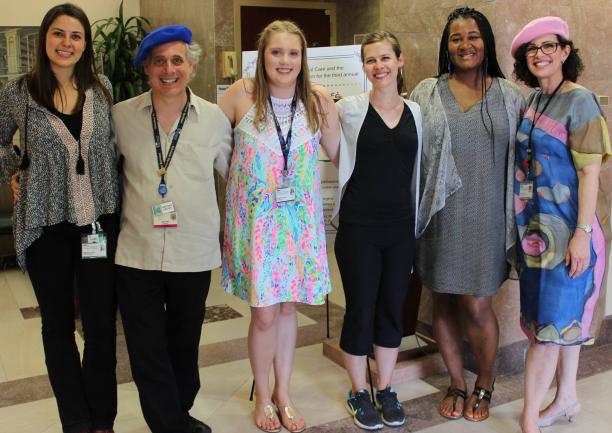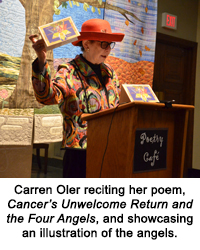From Chapel to Coffeehouse

Posted in GUMC Stories
(June 15, 2018) — As Carl Powell Jr. tapped out a quick beat on a djembe drum, Julia Langley, faculty director of the Georgetown Lombardi Arts & Humanities program, welcomed members of the Georgetown Lombardi community to the third annual Poetry Cafe in the chapel at MedStar Georgetown University Hospital.
“The program’s role here is to encourage a creative and constructive response to illness for patients, staff, caregivers and students,” she said at the June 7 event. “To that end, we bring to the hospital musicians, dancers, expressive writers and visual artists to work with all of our communities in promoting holistic health care and wellness.”
While converting a chapel into a coffeehouse may seem like an unusual practice, the intersection of spirituality and the arts goes back centuries.
“Historically, the church in the early ages was a center for cultivating the arts. It was the public square where artists and writers and musicians were able to display and perform their works,” said Deacon Thomas (Tom) Devaney, director of Mission and Pastoral Care at the hospital.
“So, when you look at what we’re doing today in 2018, the roots are historical.”
Fostering Community Through Creative Expression
Sarah Burt, office administrator of Mission and Pastoral Care, has co-led the event with Langley from its inception in 2016.
“The original idea was to create an event that would provide our hospital community the opportunity to collectively share their thoughts and experiences through poetry,” said Burt. “The team decided that a cafe could be an inviting environment in which people would feel welcome to express themselves and, from there, the idea of the Poetry Cafe took off!”
This year, the event featured more than poetry and spoken word. There were singers, musicians and even a dancer.
“We have so many people who come to the [Georgetown Lombardi] clinic and tell us how excited they are that the cafe is happening again,” Langley said. “We have people who have been involved in all three cafes and they work all year long to prepare.”
According to Langley, the magic of the cafe comes from the diverse range of participants; those watching as well as those performing poems and songs.
For example, a family member shared a poem expressing the helplessness of watching a loved one in the hospital, while a patient performed an uplifting ballad on the power of hope. One staff member expressed her own personal feelings when witnessing family members of patients receiving bad news.
“We get the patients, the staff, the doctors, the technicians, the people who do administrative tasks; having them express themselves in this wonderful unique way is just fantastic and good for building the hospital community as a whole,” said Langley.
“One of the most prominent ways for us to find God today is in the written word,” Devaney added. “How often does somebody’s poem or prose ignite reflection? This reflection often leads to a deeper understanding of the presence of God, the divine, in someone’s life.”
Sharing with Community is “Empowering”
Carren Oler, a patient at Georgetown Lombardi, performed at the poetry cafe for the third time this year. She was inspired to write her poem, Cancer’s Unwelcome Return and the Four Angels, after a remarkable experience in the intensive care unit (ICU).

“When I was in the ICU, I had a vision that I was playing peek-a-boo with the Angel of Death. I was fearful and I knew I wasn’t strong enough to fight him off,” she recounted. “So, I called on the angels. I saw their faces in my vision and they chased him away. I slept all through the night. That was, really, the turning point in my recovery.”
Confident, in a bright red hat, Oler recited, “And I sleep through the night; For the first time…without fright. My healing has begun.”
Oler credited Langley and Nancy Morgan, former director of the Georgetown Lombardi Arts & Humanities program, with inspiring her to express herself through writing as a patient at Georgetown Lombardi.
“They encouraged me to write about my experience and my feelings,” she said. “By training, I’m a lawyer and I’ve written about important issues all my life. So, I took Julia’s words to heart and I wrote.”
When asked about her experience performing her work in front of an audience, Oler shared that the experience has been “empowering” and “inspiring.”
“For those who are in active treatment, and even post-treatment, it’s important to share with others as a part of the community. It’s very helpful.”
Giuliana Cortese
GUMC Communications
